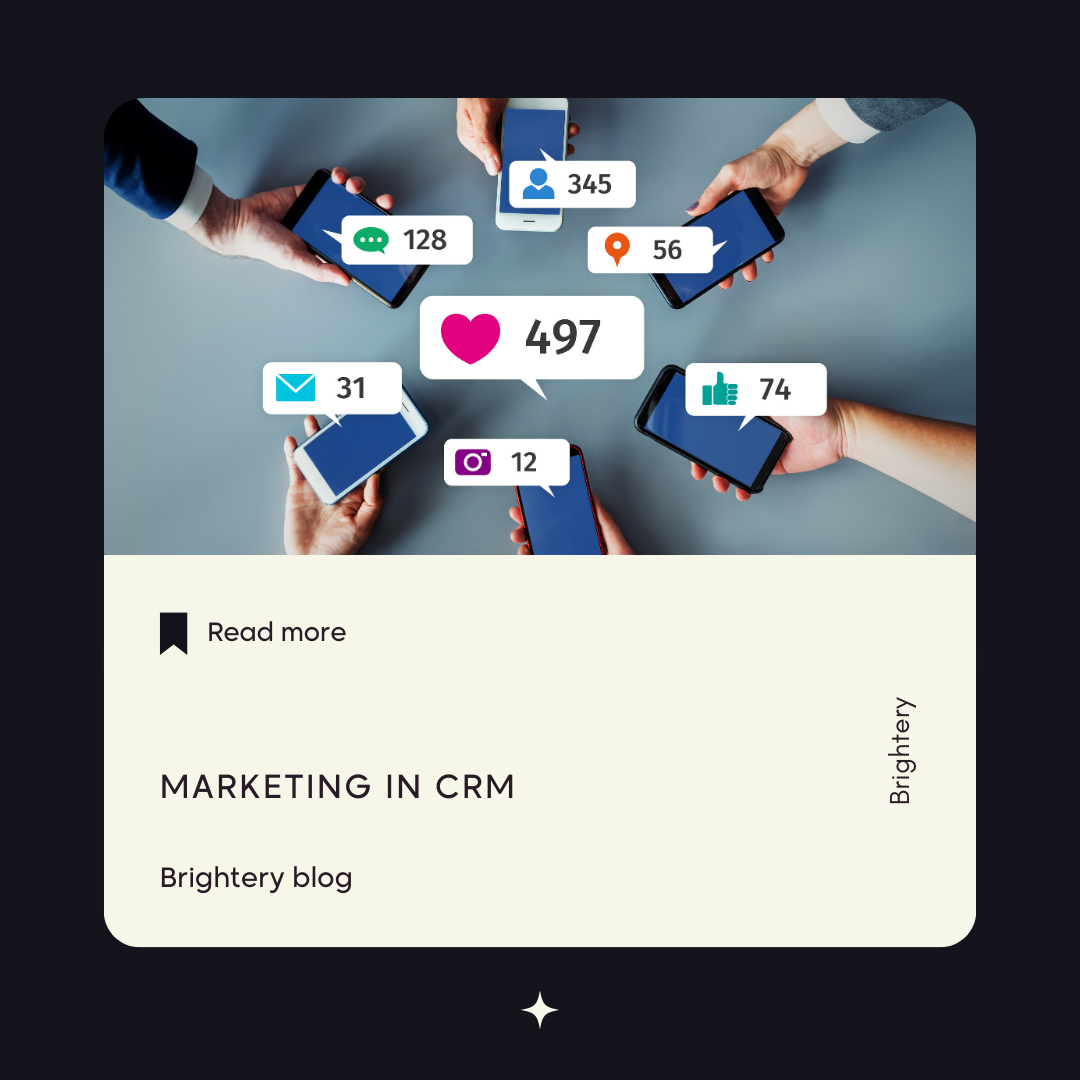Marketing in CRM (Customer Relationship Management) is a powerful approach that utilizes CRM systems and strategies to plan, execute, and track marketing activities with a focus on building strong customer relationships. By integrating marketing efforts with customer data and interactions, businesses can deliver personalized and targeted campaigns that resonate with individual customers. This article explores the key benefits of using CRM for marketing purposes, ranging from streamlined communication and improved customer understanding to increased customer acquisition and loyalty.

Marketing in CRM
Marketing in CRM (Customer Relationship Management) refers to the use of CRM systems and strategies to effectively plan, execute, and track marketing activities aimed at attracting, engaging, and retaining customers. CRM integrates marketing efforts with customer data and interactions to drive personalized and targeted marketing campaigns.
Best social media company in Jordan
Why to use CRM for business
Streamline customer communication and engagement in marketing CRM:
Marketing in CRM enables businesses to centralize customer communication and engagement, ensuring a seamless and consistent experience. It eliminates silos by integrating channels such as email, social media, and websites, allowing businesses to effectively manage customer interactions and respond promptly.
Improve customer understanding and create personalized experiences in marketing CRM:
Marketing in CRM leverages customer data to gain insights into preferences, behaviors, and demographics. This understanding enables businesses to deliver personalized experiences, tailored marketing messages, and relevant offers that resonate with individual customers.
Why social media marketing agency course important
Increase customer acquisition and expand the customer base in marketing CRM:
By utilizing customer segmentation and analytics in CRM, businesses can identify target audiences and optimize marketing efforts. This leads to increased customer acquisition rates, reaching potential customers who are more likely to be interested in the products or services, and expanding the customer base.
Nurture leads and guide them through the sales funnel in marketing CRM:
Marketing in CRM automates lead nurturing processes, allowing businesses to engage with leads effectively. By delivering relevant content, personalized follow-ups, and addressing their specific needs, businesses can guide leads through the sales funnel and improve conversion rates.
Build and maintain long-term customer relationships in marketing CRM:
CRM platforms enable businesses to track and manage customer interactions, ensuring consistent engagement. By utilizing customer data, businesses can proactively address customer needs, provide exceptional experiences, and cultivate long-term relationships based on trust and loyalty.
Maximize marketing campaign effectiveness and ROI in marketing CRM:
Marketing in CRM provides insights into campaign performance, customer responses, and conversions. By analyzing this data, businesses can optimize marketing strategies, adjust campaigns in real-time, and allocate resources effectively to maximize the return on investment (ROI) for their marketing activities.
Social media marketing agency in the USA
Optimize marketing strategies based on data-driven insights:
By leveraging CRM for marketing purposes, businesses can gain valuable data insights about customer behavior, preferences, and interactions. These insights help in optimizing marketing strategies by identifying trends, patterns, and opportunities. Through data analysis, businesses can make informed decisions, refine marketing campaigns, and allocate resources more effectively to maximize marketing effectiveness and ROI.
Enhance customer loyalty and reduce churn rates:
Marketing in CRM allows businesses to focus on enhancing customer loyalty and reducing churn rates. By leveraging customer data and insights, businesses can implement targeted retention strategies, personalized communication, and loyalty programs. This helps in strengthening the bond with existing customers, improving satisfaction, and reducing the likelihood of customer attrition.
Deliver targeted and relevant marketing messages:
CRM enables businesses to segment their customer base and deliver targeted and relevant marketing messages. By utilizing customer data and preferences, businesses can tailor marketing campaigns to specific customer segments, ensuring that the messages resonate with their needs and interests. This personalization enhances customer engagement, increases response rates, and improves overall marketing effectiveness.
Build and maintain long-term customer relationships:
CRM serves as a foundation for building and maintaining long-term customer relationships. By centralizing customer data and interactions, businesses can understand their customers better, track their preferences, and deliver personalized experiences throughout the customer journey. This fosters trust, loyalty, and repeat business, leading to sustained customer relationships and mutual growth.
Track and measure the impact of marketing efforts:
CRM platforms provide tools to track and measure the impact of marketing efforts. Through data analytics and reporting, businesses can monitor campaign performance, assess key metrics such as conversion rates, customer acquisition costs, and customer lifetime value. This enables businesses to identify successful strategies, optimize underperforming ones, and make data-driven decisions to achieve better marketing outcomes.
Increase cross-selling and upselling opportunities:
CRM systems enable businesses to identify cross-selling and upselling opportunities by analyzing customer data and behavior. By understanding customer preferences and purchase history, businesses can tailor marketing offers and recommendations that align with customer needs. This increases the likelihood of additional purchases, revenue growth, and maximizing the value of each customer relationship.
Improve overall marketing efficiency and productivity:
Marketing in CRM enhances overall marketing efficiency and productivity by streamlining processes and automating tasks. CRM platforms provide features like automated email marketing, lead nurturing workflows, and campaign management tools. These automation capabilities reduce manual effort, improve campaign execution, and free up time for marketers to focus on strategic initiatives, resulting in improved marketing efficiency and productivity.
Conclusion:
In conclusion, marketing in CRM offers an array of advantages that empower businesses to thrive in today's competitive landscape. By harnessing customer data and insights, businesses can create personalized experiences, optimize marketing strategies, and build lasting customer relationships. The use of CRM for marketing not only enhances customer engagement and loyalty but also increases marketing effectiveness and ROI through data-driven decision-making. As businesses continue to prioritize customer-centric marketing, implementing CRM strategies proves to be a crucial step in achieving sustainable growth and long-term success.

0 Comments
Post your comment